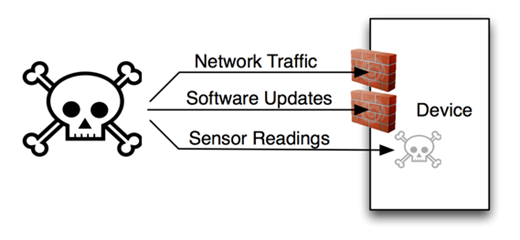Telemedicine: MALICIOUS ELECTROMAGNETIC MEDICAL INTERFERENCE
Lead Institution: University of Massachusetts Amherst
Project Leader: Kevin Fu
Research Progress
-
Abstract
Analog sensing inputs have always been considered trustworthy due to the assumption of physical proximity required to affect the sensed environment. In this work we show that carefully composed intentional wireless electromagnetic interference can alter the analog inputs, possibly resulting in improper actuation. We design defenses based on the same actuation control and sensing the resulting signals. -
Focus of the research/Market need for this project
Medical devices sensitive to malicious electromagnetic interference may be susceptible to signal injection and perform incorrectly while under attack. Current devices are engineered to electromagnetic compatibility standards that mandate resilience to random, benign interference sources. However, these standards do not solve the problem of intentional interference such as low-frequency signals for cardiac sensors.
-
Project Aims/Goals
This project aims at characterizing and understating signal injection attacks using intentional electromagnetic interference. From there, we look at protection of medical devices from signal injection attacks over electromagnetic interference, allowing them to perform while under attack. -
Key Conclusions/Significant Findings/Milestones reached/Deliverables
Our team investigated the theoretical foundations that enable signal injection attacks on analog sensors as well as possible consequences from those attacks. We measured the effect on devices from the three main cardiac implantable electrical devices. We propose defenses including a novel actuation/sense cycle that uses fundamental limits in human tissue and send test pulses and measure the response signal to determine if the device is under attack and therefore the trustworthiness of the sensing signal. -
Materials Available for Other Investigators/interested parties
Our results and publication are available on our group website and through IEEE. The project page describing some of the results are here: https://spqr.eecs.umich.edu/emi/ -
Market entry strategies
St Jude has provided to us design requirements for electromagnetic compatibility, and we conducted intentional interference experiments on devices from Medtronic, St. Jude, and Boston Scientific (the three major U.S. manufacturers of cardiac implants). We relayed our findings and publication with interference experts at FDA and FCC. We also shared copies of the final paper with medical device manufacturers.
Bibliography
Ghost Talk: Mitigating EMI Signal Injection Attacks against Analog Sensors
Denis Foo Kune, John Backes, , Shane S. Clark, Daniel B. Kramer, Matthew R. Reynolds, Kevin Fu, Yongdae Kim, and Wenyuan Xu
Proceedings of the 34th Annual IEEE Symposium on Security and Privacy; May 2013
Design Challenges for Secure Implantable Medical Devices
Benjamin Ransford, Shane S. Clark, Denis Foo Kune, Kevin Fu, and Wayne P. Burleson
Security and Privacy for Implantable Medical Devices, 157-173, 2014
